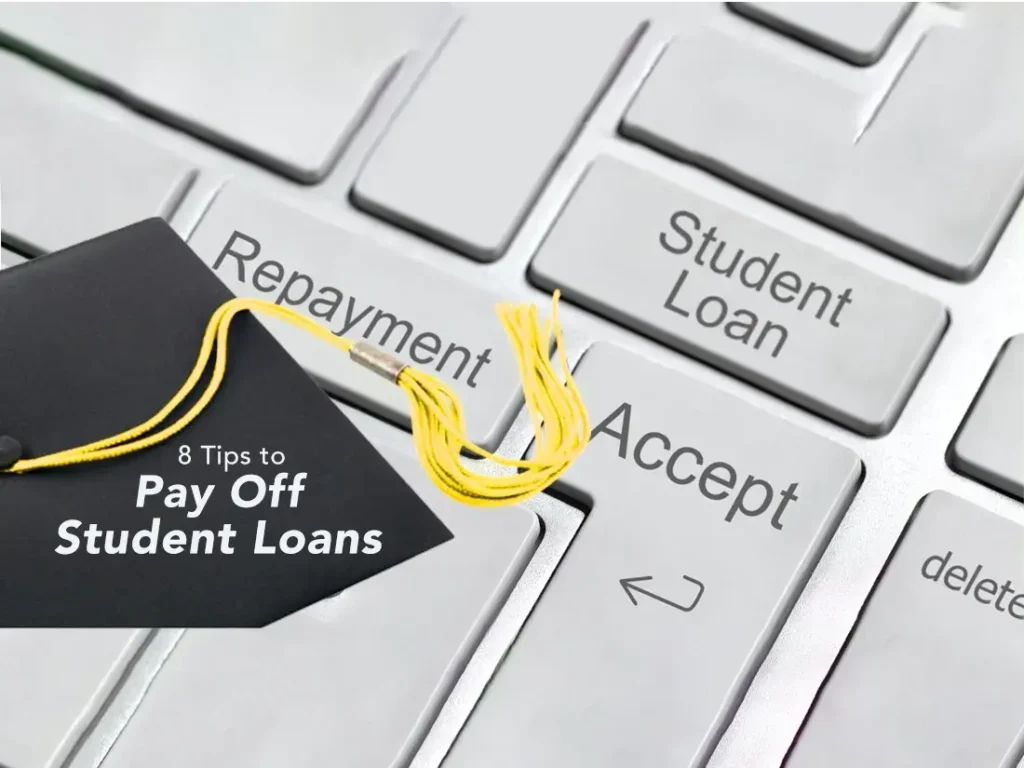Believe it or not, there will come a day when your student loans will be paid off! With the right strategies and mindset, paying off your student loans will be a “fight”, but is within reach!
Here’s the “battle:”
- Black college graduates owe an average of $25,000 more in student loan debt than white college graduates.
- Four years after graduation, 48% of Black students owe an average of 6% more than they borrowed.
- Black student borrowers are the most likely to struggle financially due to student loan debt, making monthly payments of $289.
Black college students require more financial aid due to the lack of family wealth. Yes, the racial wealth gap contributes to our challenges. However, we shall overcome. We MUST advocate for better public policy – including student debt forgiveness. We must also focus on reducing our student loan debt.
Here are 8 actionable tips to help you pay off your student loans faster and more intentionally. So, let’s get started and empower you to achieve financial freedom!
1. Create a Budget
- The golden rule is to always start with a budget. Start by tracking your income and expenses, and then identify areas where you can cut back. Use the extra money to pay your loans down faster.
- Our Money Management tool is your one-stop solution to track your expenses and spot trends in your buying habits that you can alter to help save money!
2. Make Extra Payments
- Making extra payments can help pay off your student loans faster and save money on interest. Consider making bi-weekly payments instead of monthly payments to reduce the overall interest you pay.
- You will pay less over the total lifetime of the loan when you pay it down faster. How? Well, interest comes into play. The longer the loan lifetime, the more interest you pay on the outstanding balance.
- If you receive a windfall, such as a bonus, consider using it to pay off your student loans. This can help you make a big dent in your debt and reduce the overall interest you pay.
3. Refinance Your Loans
- If you have good credit and a steady income, refinancing your loans can help you save money on interest and pay off your loans faster. Look for lenders that offer low-interest rates and flexible repayment terms. You can combine multiple student loans into one private loan.
- Consider your credit score to refinance. The better your score, the better the interest rate you can obtain! It’s recommended to refinance when you have a steady income and a high 600 credit score
4. Use your tax refund.
- If and when you receive a tax refund, consider using it to make a lump sum payment on your loans. These extra efforts can make a world of difference in reducing your overall balance and save you money on interest. Every chance you get to pay more than the minimum on your loan each month, take it!
5. Consider loan forgiveness or employer repayment programs
- Check out this resource from Federal Student Aid to research if you qualify for any of the different types of forgiveness or cancelation programs. These programs can depend on your field of work or type of loan.
- Less common but highly attractive, many employers offer repayment assistance programs as part of their benefits package. Check with your employer to see if you qualify.
6. Pay off high-interest loans first.
- If you have multiple student loans, focus on paying off the ones with the highest interest rates first. This can help you save money on interest in the long run. The key here is to stay focused as your debt with the highest interest rate could also be your largest debt and take a while to pay off.
7. Consider income-driven repayment plans.
- Designed for those whose loan payments are expensive versus their actual income, income-driven repayment plans help set a monthly loan payment that is affordable.
- Check to see if you are eligible on the Federal Student Aid platform for the different kinds of loans made available.
8. Enroll in Autopay.
- Federal student loan services and many private lenders provide a deduction in your interest rate when you sign up for autopay. Some of these deductions will be 0.25 percentage points. Take advantage of the lower rate – just one way to pay less over the lifetime of your loan!
Paying off student loan debt requires a combination of strategy, discipline, and patience. Celebrate small victories along the way and remind yourself of the benefits of being debt-free.
Federal action is required to address the compounding effects of our nation’s racist history and forgotten promises on Black student loan debt. The cycle we are addressing requires accountability and recognition of how we got here – not of our own accord!
In the meantime, remember the key for us is to stay focused, stay motivated, and keep working towards our goals. #BankBlack


















